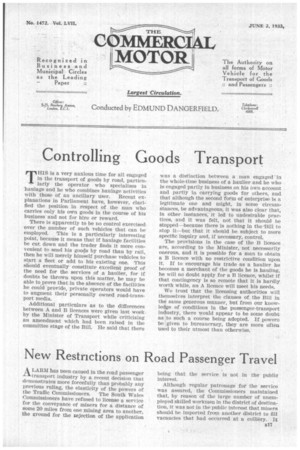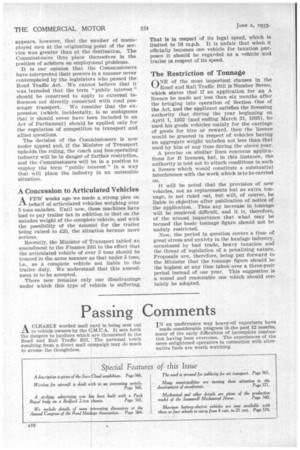New Restrictions on Road Passenger Travel
Page 35

Page 36

If you've noticed an error in this article please click here to report it so we can fix it.
ALARM has been caused in the road passenger transport industry by a. recent decision that demonstrates more forcefully than probably any previous ruling, the elasticity of the powers of the Tragic Commissioners. The South Wales Commissioners have refused to license a service for the conveyance of miners for a distance of some 20 miles from one mining area to another, the ground for the rejection of the application being that the service is not in the public interest.
• Although regular patronage for the service was assured,. the Commissioners maintained that, by reason of the large number of unemployed skilled workmen in the district of destination, it was not in the public interest that miners should be imported from another district to fill vacancies that had occurred at a colliery. It appears, however, that the number of unemployed men at the originating point of the service was greater than at the destination. The Commissioners thus place themselves in the position of arbiters on employment problems.
It is our opinion that the Commissioners have interpreted their powers in a manner never contemplated by the legislators who passed the Road Traffic Act. We cannot believe that it was intended that the term "public interest" should be construed to apply to eternal influences not directly connected with road passenger transport. We consider that the expression (which, incidentally, is so ambiguous that it should never have been included in an Act of Parliament) should be applied only for the regulation of competition in transport and allied questions.
The decision of the Commissioners is now under appeal and, if the Minister of Transport upholds the ruling, the coach and bus-pperating industry will be in danger of further restriction, and the. Commissioners will be in a position to employ the term "public Interest" in a way that will place the industry in an untenable situation.
A Concession to Articulated Vehicles
A FEW weeks ago we made a strong plea on -EX behalf of articulated vehicles weighing over 5 tons unladen. Until now, these machines have had to pay trailer tax in addition to that on the unladen weight of the complete vehicle, and with the possibility of the amount for the trailer being raised to £20, the situation became more serious.
Recently, the Minister of Transport tabled an amendment to the Finance Bill to the effect that the articulated vehicle of over 5 tons should be treated in the same manner as that under 5 tons, i.e., as a complete vehicle not liable to the trailer duty. We understand that this amendment is to be accepted.
There now remains only one disadvantage under which this type of vehicle is suffering. That is in respect of its legal speed, which is limited to 16 m.p.h. It is unfair that when it officially becomes one vehicle for taxation purposes it should be regarded as a vehicle, and trailer in respect of its speed.
The Restriction of Tonnage
ONE of the most important clauses in the Road and Rail Traffic Bill is Number Seven, which states that if an application for an A licence be made not less than six months after the bringing into operation of Section One of the Act, and the applicant satisfies the licensing authority that during the year beginning on April 1, 1932 (and ending March 31, 1933), he used his goods vehicles mainly for the carriage of goods for hire or reward, then the licence would be granted in respect of vehicles having an aggregate weight unladen not less than that used by him at any time during the above year.
A proviso on similar lines concerns applications for R licences, but, in this instance, the authority is told not to attach conditions to such a licence which would constitute a substantial Interference with the work which is to be carried on.
It will be noted that the provision of new vehicles, not as replacements but as extra tonnage, is not ruled out, but will, of course, be liable to objection after publication of notice of the application. Thus any increase in tonnage will be rendered difficult, and it is, therefore, of the utmost importance that what may be termed the basic tonnage figure should not be unduly restricted.
Now, the period in question covers a time of great stress and anxiety in the haulage industry, occasioned by bad trade, heavy taxation and the threat of legislation of a penalizing nature. Proposals are, therefore, being put forward to the Minister that the tonnage figure should be the highest at any time taken over a three-year period instead of one year. This suggestion is a sound and reasonable one which should certainly be adopted.




































































































